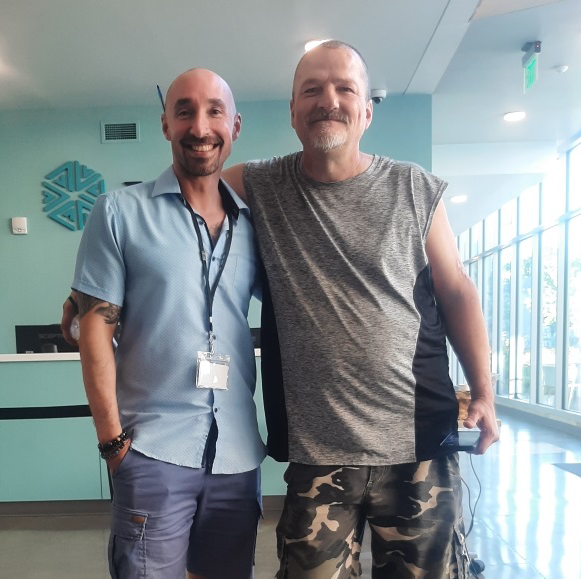Michael Hovey never gave up on himself, and now he’s thriving in long-term recovery.
As a peer recovery support specialist with Fora Health in Portland, Ore., he urges individuals to approach recovery from mental health and substance use challenges the same way — never give up hope.
“I am here to help individuals realize their value in life, to build confidence and ultimately help put them in position to make decisions that align to their values and a life worth living,” Hovey said.
It can be difficult to succeed in long-term recovery without support. So, as we observe Recovery Month in September, it’s important to highlight the role peer recovery support specialists play in the recovery journeys of others.
Hovey was reminded of the role he plays in the lives of people when someone he supported stopped by Fora Health in late August to share that he had been sober for two years.
“As his mentor, I was able to encourage him to push forward while we focused on alleviating some of the pressure points — he needed an ID and a Social Security card. He needed a phone, access to benefits and had dental issues that needed to be addressed,” Hovey said. “He stayed engaged in our outpatient services and our alumni group. That led to a part-time job. Fast forward another year and a half and he is making over $25 an hour and has been sober for two years. This man is vibrant and full of life. To see his journey — and to help him complete that journey — is proof that miracles are real.”
We need more miracles.
Research has shown that peer supports for people with substance use or mental health challenges contribute positively to treatment outcomes, reduce rates of recurrence of symptoms and improve wellbeing.
The New York Association of Psychiatric Rehabilitation Services (NYAPRS) found an average reduction of over 43% in inpatient services for clients who received peer support services, according to the National Alliance on Mental Illness, and a nearly 30% increase in outpatient treatment visits.
Research also has shown that peers support recovery outcomes (which differ from treatment outcomes) by providing ongoing support beyond or outside traditional interventions. Peers establish strong connections with individuals in recovery, often extending well beyond the formal treatment period (and sometimes in lieu of treatment).
“Peer recovery support services are a critical part of the substance use disorder and mental health ecosystem,” National Council senior advisor Elizabeth Burden said. “It’s about person-centered care by putting the individual seeking support at the heart of their own recovery process. Peer workers do that by creating an environment of trust, empathy and understanding. Peer workers can relate to the struggles of those they assist, having experienced similar challenges themselves, and can, therefore, offer a kind of support other specialists cannot.”
Whether it’s driven by the workforce shortage or by the recognition that peers fulfill a vital role, peer specialists have become one of the fastest-growing professions in the field of mental health and substance use treatment and care. A report last year on Certified Community Behavioral Health Clinics (CCBHCs) noted that 84% of CCBHCs have hired peers.
Hiring more peers won’t eliminate the workforce shortage, but it will fill gaps in care and provide clients with much-needed resources.
As Psychiatric News reported early this year, “it would be a mistake to focus attention on expanding the workforce of peer support specialists at the exclusion of expanding the number of psychiatrists, licensed clinical social workers and psychiatric nurses.”
However, more peers also can help reduce stigma, according to National Council senior advisor Aaron Williams.
“As more people see peer specialists — people with lived experience — provide valuable guidance to those in recovery, it helps chip away at the stigma surrounding people who use drugs,” Williams said. “Peers offer people in recovery the guidance they can’t get from anyone else. When people see that, it illustrates their value, their skills and their contributions.”
In June, the Substance Abuse and Mental Health Services Administration (SAMHSA), the Office of Recovery and the U.S. Department of Health and Human Services (HHS) released new national model standards for peer support certification focused on the behavioral health workforce to speed up “universal adoption, recognition and integration” of the peer mental health workforce across the country, according to Behavioral Health Business.
Those long-overdue policy updates will help standardize the role of peers, but other issues, including reimbursement, still require clarity before we can take full advantage of the skills people with lived experience have to offer.
“Peers are proof that recovery is possible. Our ability to use our lived experience — to walk alongside someone, identify barriers that prevent their progress, help navigate systems of care, connect people to resources and support them the entire way — can be very empowering,” Hovey said. “By embracing and demonstrating the spirit of recovery every day, I can help the skeptics understand recovery is possible and turn non-believers into believers.”
Check out our Recovery Month 2023 resources, and sign up for our newsletters to stay informed about our work on peers and other important issues.




